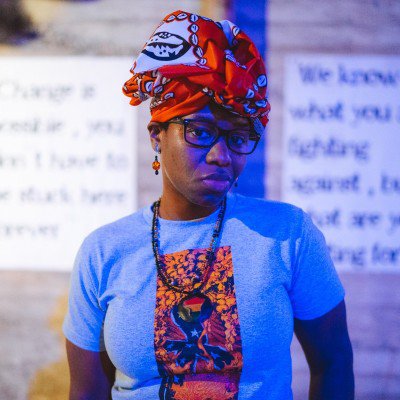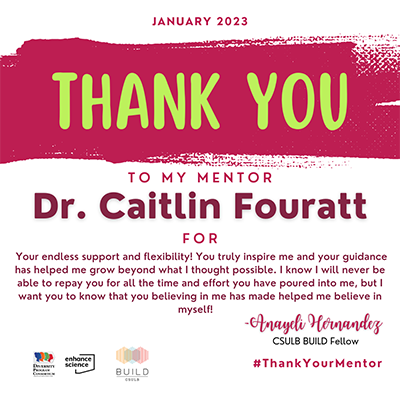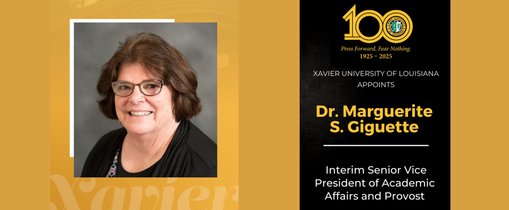
Consortium News
Spotlight on XULA BUILD mentor Charity Clay
By Brhea Washington
The role of a mentor is powerful because they shape and impact the lives of future generations.
Charity Clay, PhD, assistant professor of sociology at Xavier University of Louisiana (XULA), is no different. In her role as teacher and XULA BUILD mentor, she recognizes her vital role in making a difference in her students’ lives.
“As this generation of scholars experiences the world, there is a need for Black people doing research, analyzing data, making policy recommendations, and changing the way we operate our healthcare, criminal justice and education systems,” said Clay, who has been a XULA BUILD mentor for two years and has received support from the program to further her research studies.

Charity Clay, PhD
Through her mentorship, Clay has been able to introduce the research process to her mentees and discuss significant topics affecting the Black community.
Clay’s primary XULA BUILD project with her mentees Destiny and Alia studies systemic police terrorism and a larger framework of her research is investigating the non-directly fatal impacts of police violence, including its psychological and emotional ramifications. Her research is one way in which she ties in crucial topics that affect the lives of people of color worldwide.
“The project with my BUILD students looks at how heart rhythms are connected to specific emotions, and how they are impacted by specific exposure to non-fatal police violence. We’re using HeartMath technology, and I was able to get devices to pilot this research through BUILD,” Clay said.
HeartMath technology can be used to help identify mental health conditions, such as anxiety and depression. The resource includes a heart facilitator course and other courses to receive clinical certifications for stress, anxiety and self-regulation, and trauma-sensitive certifications. It also shares healthy interventions to address mental health and utilizes a system of effective, scientifically based tools to bridge the intuitive connections between heart and mind.
XULA BUILD provided funding for Clay’s mentees to receive these trainings. As a result, they’re learning techniques to counsel, advise and talk to groups of people about how to recognize emotions connected to their heart rate and how it affects their mental health.
Clay’s second BUILD project is a film titled “The Black Triangle” that explores the connection between Senegal, Haiti and Louisiana as the three major sites of the former French colonial empire. It looks at how Black culture is similar and yet unique in each location and throughout the diaspora. Her mentee Celeste will assist with interviewing locals in New Orleans to provide insight on the connections to Haiti and Senegal, with a possible opportunity to travel with Clay to conduct interviews in these places.
Clay’s inspiration as a mentor stems from knowing how impactful her role is in fostering her students’ minds and recognizing the importance of representation at Xavier as an Historically Black College and University (HBCU).
“I’m inspired by the ability to be involved in developing the next generation of scholars and researchers, specifically at an HBCU, because the majority of our population is Black women,” she said. “As a Black woman and social scientist, it’s great to not only mentor student skills but also to help them understand the landscape of what it looks like to be in this space.”
Another aspect of mentorship significant to Clay is ensuring her students possess confidence. She emphasized that confidence is critical for mentees as it allows them to not question their abilities but instead be self-assured as they enter academic spaces.
“As educators, we sometimes may perceive hesitancy, lack of engagement or reluctance to participate as a lack of knowledge. However, students will have the correct answers and amazing insight, but sometimes they just lack confidence. I've learned students just need the support to help articulate it,” Clay said.
She also emphasized the power of research because research data drives policy and funding decisions and impacts communities. Clay has loved encouraging HBCU students to be involved in research processes and, in turn, be part of the change.
Clay also aims to foster individuality in her students as a XULA BUILD mentor and provide them with room to grow in their own unique way. She supports her mentees creating their own identities and staying true to themselves.
“I want to encourage students to be who they are and allow them to develop their own methods and routines. My BUILD students are all different, so it’s important to allow them to be different but still help them develop as researchers, creatives, and academics,” she said. “It’s also important to let them know that they don’t have to take one path or trajectory. Any work they do or anything they find passion in is relevant and valuable.”
For Clay, essential aspects of mentorship are role modeling and training. As a mentor, role modeling allows her to lead by example and showcase what being a researcher looks like. Training enables mentees to foster independence to create their own projects that they can potentially continue post-undergraduate.
Clay’s mentee relationships have left a lasting impact on her.
“I am reaffirmed that the world my students are growing into is something they are curious about understanding. They have amazing thoughts, and the things they point out are really insightful,” she said.
Mentoring the next generation has helped her better understand her mentees’ perspectives and worldviews. It has also created intergenerational communication between her and her mentees.
Clay expressed how XULA BUILD has shaped her as a mentor and professor.
“I’m appreciative that XULA BUILD has allowed me to engage students in research, which is something that I love to do. It's helped me find a better balance between teaching and research because, if nothing else, I have to show up for my mentees,” she said.
Clay exemplifies the power of mentorship through her commitment and dedication to student success. She is thankful for XULA BUILD’s support and the opportunity to play a role in shaping the lives of her mentees.
CSULB scholars celebrate Thank Your Mentor Day
By Nicole Streicker
On Jan. 26, California State University, Long Beach (CSULB) BUILD mentees took the time to thank their mentors for national Thank Your Mentor day.
Annually, the CSULB BUILD team enjoys celebrating their mentors during National Mentoring Month in January. The team reaches out to current BUILD trainees to invite them to participate in Thank Your Mentor Day and this year, they were elated with the response.
The trainees were more than happy to let their mentors know how important their support is to them. Trainees submitted 17 thank you notes to their mentors – the highest response to date! This may have been spurred on by a little competition because they wanted CSULB to be well represented among the other DPC BUILD sites!
BUILD Fellow Anayeli Hernandez’s submission illustrates the powerful impact a mentor can have on trainees’ accomplishments and self esteem.


“Thank you for your endless support and flexibility! You truly inspire me and your guidance has helped me grow beyond what I thought possible,” Hernandez wrote about her Faculty Research Mentor Caitlin Fouratt, PhD. “I know I will never be able to repay you for all the time and effort you have poured into me, but I want you to know that you believing in me has . . . helped me believe in myself!”
Nicole Streicker, BUILD Program Manager, said a highlight of this year’s submissions was from Antonio Arreguin, a Year Two Scholar.
“Antonio chose to thank his BUILD Graduate Mentor, Isabella Di Lauro. Graduate Mentors play such an integral role to trainees’ success while in the program and applying to graduate school,” Streicker said. “It is so touching that trainees recognize their graduate mentors and thank them for their support.”
To see all of CSULB BUILD scholars’ thank you messages, read the National Mentoring Month recap.
XULA BUILD PI named interim Provost, Senior VP of Academic Affairs
By Brhea Washington

XULA BUILD PI Marguerite S. Giguette, PhD
Marguerite S. Giguette, PhD, a beloved icon of the Xavier University of Louisiana (XULA) community for over 30 years, has been named the interim Senior Vice President of Academic Affairs and Provost.
Giguette is a XULA BUILD principal investigator who started at Xavier as a computer science faculty member. Her passion for elevating the opportunities offered to students has guided her on her journey to multiple leadership positions at the university.
“I am hoping that our Xavier community sees what I see in Xavier – a university that strives to work for the success of all students as they prepare for life after Xavier. I hope that all will see that student success requires that we all work together. It is through this lens that I am excited about my role as Interim Provost,” Giguette said. “As I step into my new role, I look forward to working with the Xavier community as we continue to provide excellent academic programs and services to our students.”
Giguette directs XULA BUILD’s Institutional Development Core (IDC), which provides resources for key offices and centers across the campus that assist with students’ academic support, professional development and undergraduate research activities.
“IDC looks at student support that is needed for the BUILD program, which involves supporting students as they make career choices, do biomedical research, apply and go to graduate school and helps them develop a good foundation for their coursework,” Giguette said, adding that she has enjoyed her experience as a XULA BUILD leader witnessing the program’s impact on students.
“My XULA BUILD experience has been fantastic because we’re able to see how much BUILD is making a difference. Through tutoring and supplemental instruction, we see data results of how students are utilizing resources and are therefore more likely to pass their classes and be on track to graduate.”
Throughout her time at Xavier, Giguette has proven to be a leader committed to student support.
She has secured over $4 million in grants from government agencies and foundations for the university that have supported efforts at the department and university levels, advancing resources and offerings for students, staff and faculty. Initiatives funded through these grants have also supported the establishment of Xavier’s Center for Undergraduate Research and Graduate Opportunity (CURGO), as well as other scholarship and academic opportunities for students.
Giguette’s work with XULA BUILD has also assisted in her academic journey to become the university’s interim Provost.
“XULA BUILD afforded me the opportunity to work with university offices, learn what they do and see how we can do things better,” Giguette said. “Collaboration to determine how best to support students has really prepared me for this new role as Interim Provost.”
Giguette’s work at Xavier and XULA BUILD exemplifies her diligent leadership and commitment to education.
MyMentor: A guided mentoring experience
By Gabrielle Saleh and Damaris Javier
Students looking for a way to personally connect with a mentor to achieve their goals can do so through the National Research Mentoring Network’s (NRMN) MyMentor program.
MyMentor is a guided virtual mentoring program within MyNRMN. Once students are matched with a mentor they will embark on a mentoring journey with a timeline of goals, which can be edited to fit their needs. To do this, NRMN provides students with guided prompts to encourage conversations with mentors.
NRMN also provides various ways to get in touch with mentors, including a discussion board where mentees can write posts to their mentors and share files, as well as a virtual meeting space, where video calls with mentors can be scheduled for a more personal mentoring interaction.

If an institution wants to use MyMentor for their mentors and mentees, NRMN can make that happen. Email info@nrmnet.net and the team will work with you to find out what best fits your needs.
Want to get started? Sign up for MyNRMN to access MyMentor today.
New NRMN course helps mentors strengthen relationships
By Gabrielle Saleh and Damaris Javier

A new course designed by the National Research Mentoring Network (NRMN), “Mentoring Undergraduate Students,” will help mentors of undergraduate students looking to strengthen their mentoring relationships.
Participants will learn to appreciate and communicate to mentees about the importance of mentoring in their development as researchers, as well as articulate the pros and cons of different mentoring models, routinely reflect on and adapt their research mentoring practices, and much more.
Although the “Mentoring Undergraduate Students” course focuses on mentoring in the biomedical, behavioral, and social sciences, the principles can apply to other fields, too.
If an institution or organization would like to have their mentors take the course, NRMN can help them create a cohort and start enrollment. Email info@nrmnet.net to get started!
The Coordination and Evaluation Center at UCLA is supported under award number U54GM119024.

Grow Together.
